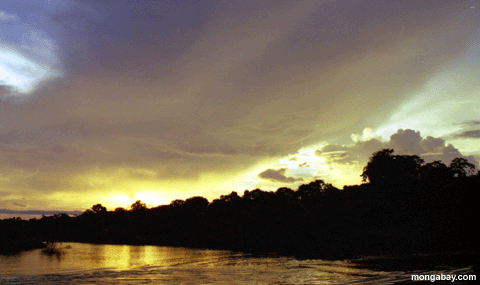|
|
|
|
|

|
|
Deforestation Figures for Brazil
|
Year | Deforestation
[sq mi] | Deforestation
[sq km] |
| | |
| 1978-1988* | 8158 | 21,130 |
| 1990 | 5,332 | 13,810 |
| 1991 | 4,297 | 11,130 |
| 1992 | 5,322 | 13,786 |
| 1993 | 5,950 | 15,410 |
| 1994 | 5,751 | 14,896 |
| 1995 | 11,219 | 29,059 |
| 1996 | 7,013 | 18,160 |
| 1997 | 5,034 | 13,040 |
| 1998 | 6,501 | 16,840 |
| 1999 | 6,663 | 17,259 |
| 2000 | 7,658 | 19,836 |
| 2001 | 7,027 | 18,130 |
| 2002 | 9,845 | 25,500 |
| 2003 | 9,343 | 24,130 |
All figures derived from official National
Institute of Space Research (INPA) figures
*For the 1978-1988 period the figures represent
the average annual rates of deforestation.
|
|
Amazon burning makes Brazil a top greenhouse gas polluter
Deforestation in the Brazil 2004
Amazon burning makes Brazil a leading polluter
Mon 19 July, 2004 22:11
By Axel Bugge
Original Article
BRASILIA, Brazil (Reuters) - Burning of the Amazon rainforest has made Brazil one of the world's top 10 polluters, raising pressure on the government to curb destruction of the jungles, scientists say.
The government should publish within months a long-delayed inventory of Brazil's greenhouse gas emissions, which is widely expected to challenge the view that the Amazon serves as the "lungs of the world" by converting carbon dioxide into oxygen.
Instead, it will show that a large majority of Brazil's greenhouse gas emissions, which contribute to global warming, come from smoke linked to deforestation of the Amazon, and not fossil fuels which are the main culprit in most countries.
Paulo Moutinho, a researcher at the nongovernmentalInstitute for Amazon Research, said the inventory should show that Brazil produces around 300 million tonnes of carbon dioxide-equivalent a year, 200 million of which comes from logging and burning of the world's largest tropical forest.
That puts Brazil above bigger economies like Italy and Canada and among the globe's top 10 leading polluters.
"The report will be thorough, but it will certainly put Brazil in a situation where it will have to look more closely at its emissions," said Moutinho. "It will be official recognition of the large dimension of burning in the Amazon."
Destruction of the Amazon jungle, which is larger than the continental United States and home to up to 30 percent of the globe's animal and plant species, reached its second-highest level last year.
An area of 5.9 million acres (2.38 million hectares), bigger than the U.S. state of New Jersey, was destroyed as loggers and farmers hacked and burnt the forest in 2003.
KYOTO PROTOCOL
Environmentalists lament the failure to stop the destruction and many fear that expansion of roads and farming in the region will only make things worse.
Carlos Nobre, head of weather forecasting and climate change at Brazil's National Institute of Space Research, said that under the Kyoto Protocol to curb greenhouse gas emissions Brazil is not obliged to cut emissions. Brazil produces relatively little pollution from fossil fuels for its size because energy comes mainly from clean, hydroelectric power.
"The only way Brazil has of contributing to a reduction in global pollution is to cut deforestation," said Nobre. "It would be a way for Brazil to participate in the spirit of the (Kyoto) treaty even if it has no obligation to cut pollution."
Brazil has signed the Kyoto Protocol.
The government's general-coordinator of climate change, Jose Domingos Miguez, said he hopes the report is ready in the next two months, but that drawing attention to deforestation was the wrong focus.
"Making deforestation the issue would turn the focus away from the real problem, which is fossil fuel burning," he said. "You can't have the focus on 200 million tonnes and take the focus away from the United States, which is the big villain."
Brazil's position is that rich, developed countries need to make the greatest sacrifice to cut greenhouse gas emissions.
Miguez said Brazil is doing its best to reduce Amazon deforestation but it is difficult to change a "normal process of land occupation."
He said Brazil's greenhouse gas emissions only represent about three percent of the global total, about the same as the size of the economy. The United States, the world's biggest polluter and not a signatory to the Kyoto Protocol, produces an estimated 25 percent of the global total.
Copyright 2004, Reuters
CONTENT COPYRIGHT Reuters. THIS CONTENT IS INTENDED SOLELY FOR EDUCATIONAL PURPOSES.
| |